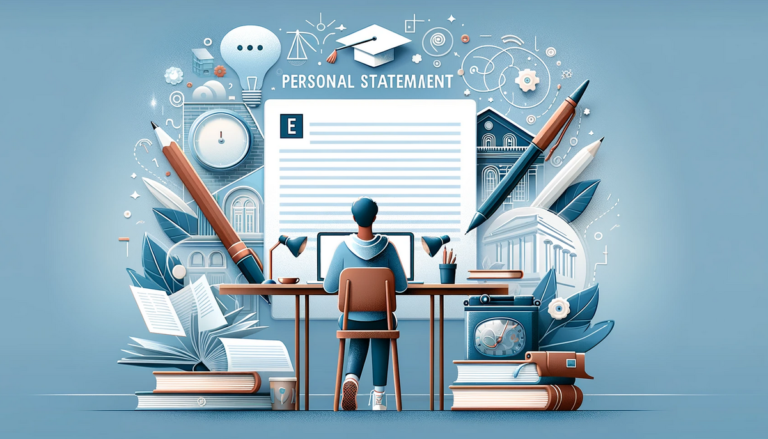Admission Writing Guides
How to Write a Personal Statement: Expert Tips and Real-Life Examples
Share

A personal statement is a critical component of many application processes, whether for college admissions, scholarships, or job applications. It is a unique opportunity for applicants to present their personal experiences, achievements, and aspirations in a compelling narrative. Unlike other parts of the application, the personal statement allows individuals to showcase their personality, voice, and what makes them unique. Writing a well-written personal statement can significantly impact an applicant’s chances of standing out in a competitive selection process.
In this article by Masters Writers, we will explore the various aspects of writing an outstanding personal statement. From understanding what a personal statement is to discovering what makes one great, we will provide you with valuable tips and insights. We will guide you through brainstorming effective topics and structuring your statement for maximum impact. Additionally, we will share four exemplary personal statement examples and address frequently asked questions to help you master the art of personal statement writing. Whether you are a student applying to college or a professional seeking new opportunities, this comprehensive guide will equip you with the tools you need to create a memorable and impactful personal statement.
What is a Personal Statement?
A personal statement is a written narrative allowing individuals to present their background, experiences, skills, and aspirations. Often required in applications for college admissions, scholarships, or jobs, it provides a unique opportunity to showcase one’s personality and individuality beyond academic records and resumes. A well-written statement highlights key achievements, explains motivations, and demonstrates how one’s goals align with the opportunity they are seeking. It is a chance to tell your story, express your passion, and make a compelling case for why you are a suitable candidate.
What Makes a Great Personal Statement?
A great personal statement effectively captures the essence of who you are and presents your unique qualities compellingly and engagingly. It should be clear, concise, and focused, offering a personal narrative that reflects your aspirations. Here are some key elements that contribute to a standout personal statement:
- Authenticity: Be genuine in your writing. Admissions officers and employers can easily detect when someone is not being authentic. Share real experiences, feelings, and insights. Your true voice will resonate more strongly than a fabricated story.
- Clear Structure: Organize your statement with a clear introduction, body, and conclusion. Start with a strong opening that grabs attention, follow with detailed paragraphs that illustrate your experiences and achievements, and conclude with a powerful closing that reinforces your key message.
- Specific Examples: Use concrete examples to illustrate your points. Instead of making general statements, provide specific instances highlighting your skills, accomplishments, and personal growth. This makes your narrative more vivid and believable.
- Reflective Insight: A great personal statement doesn’t just list achievements; it reflects on what these experiences have taught you and how they have shaped your goals. Demonstrating self-awareness and the ability to learn from experiences can set you apart.
- Relevance: Tailor your statement to the specific opportunity you are applying for. Highlight how your background, skills, and aspirations align with the institution’s or organization’s values and goals.
- Strong Writing: Ensure your writing is polished and free of grammatical errors. Use varied sentence structure and vocabulary to keep the reader engaged. A well-written statement demonstrates your communication skills and attention to detail.
By incorporating these elements, you can write a personal statement that stands out and effectively conveys who you are and why you are an excellent fit for the opportunity you are pursuing.

Never Written Personal Statements Before?
Professional writers across dozens of subjects can help you right now.
What are Some Great Personal Statement Topics? (aka How do I brainstorm mine?)
Choosing the right topic for your personal statement is crucial to making a strong impression. Below are some strategies and ideas to help you brainstorm great topics:
- Reflect on Personal Experiences: Think about significant moments in your life that have shaped who you are. This could include overcoming challenges, memorable achievements, or meaningful experiences that have influenced your career or academic goals.
- Identify Core Values and Beliefs: Consider what values and beliefs are central to your identity. Writing about how these values have guided your decisions and actions can provide a deep insight into your character.
- Highlight Unique Skills or Talents: If you have a particular skill or talent that sets you apart, discuss how you developed it and its impact on your life. This can demonstrate your dedication and passion.
- Discuss Personal Growth: Describe experiences that have led to personal growth and self-discovery. This could include travel experiences, volunteer work, or pivotal moments that changed your perspective.
- Future Aspirations: Share your long-term goals and how your past experiences have prepared you to achieve them. Linking your aspirations with specific programs or opportunities shows foresight and ambition.
- Inspirational Figures: Write about individuals who have inspired you and how their influence has shaped your goals and values. This can add a personal touch and context to your narrative.
By reflecting on these areas, you can brainstorm topics that highlight your unique qualities and align with the personal statement’s objectives.
How Should I Write a Personal Statement?
Writing a personal statement can be daunting, but with a structured approach, you can create a compelling narrative showcasing your strengths and aspirations. The section below highlights how to approach it:
- Understand the Prompt
- Carefully read and understand the prompt or guidelines the institution or organization provides.
- Note any specific questions or themes you need to address.
- Brainstorm Ideas
- Reflect on your experiences, achievements, and goals.
- Identify key themes or events that have significantly impacted your life.
- Consider your values, skills, and what makes you unique.
- Create an Outline
- Introduction: Start with a hook to grab the reader’s attention. Introduce yourself and outline the main points you will cover.
- Body Paragraphs: Develop each main point with specific examples and experiences. Ensure each paragraph focuses on a single theme or story.
- Paragraph 1: Highlight a significant experience or achievement.
- Paragraph 2: Discuss personal growth or a challenge you’ve overcome.
- Paragraph 3: Explain your future goals and how the opportunity aligns with them.
- Conclusion: Summarize your main points and restate your interest in the program or position. End with a strong, memorable statement.
- Write the First Draft
- Use clear, concise language.
- Be honest and authentic.
- Focus on showing rather than telling—use specific examples to illustrate your points.
- Revise and Edit
- Review your draft for clarity, coherence, and relevance.
- Ensure there are no grammatical errors or typos.
- Seek feedback from mentors, teachers, or peers.
- Tailor to the Audience
- Customize your personal statement for the specific program or role you are applying for.
- Highlight how your background, skills, and aspirations align with the institution’s or organization’s values and goals.
- Final Review
- Read your personal statement out loud to catch any awkward phrasing.
- Ensure it adheres to the required length and format.
- Make any final adjustments to ensure it is polished and professional.
Following these steps, you can write a personal statement that effectively communicates your strengths, experiences, and aspirations, making a lasting impression on the reader.
Five Personal Statement Examples
Personal Statement Example 1
Prompt: Describe a significant challenge you faced and how you overcame it. What did this experience teach you about yourself, and how has it influenced your goals and aspirations?
During my junior year of high school, I faced a significant challenge that tested my resilience and determination. My family relocated to a new city halfway through the school year, which meant adjusting to a new environment, making new friends, and catching up with a different curriculum. The transition was daunting; I felt overwhelmed by the unfamiliar surroundings and the pressure to perform well academically amidst the upheaval.
The first few weeks were particularly challenging. I struggled to find my footing in classes that were ahead of where my previous school had left off. Socially, I felt isolated and unsure how to connect with my new peers. However, I realized I had a choice: I could let these difficulties hinder my progress or embrace the challenge and grow from it.
I chose the latter. I sought help from my teachers, explaining my situation and asking for guidance on how to catch up. They provided me with additional resources and support, which I diligently used to bridge the academic gap. I also joined several extracurricular activities, including the debate club and the soccer team, to meet new people and integrate into the school community. These efforts paid off; I caught up with my coursework, formed meaningful friendships, and developed a stronger sense of belonging.
This experience taught me the value of perseverance, adaptability, and proactive problem-solving. I learned that challenges can be opportunities for growth if approached with a positive mindset and a willingness to seek and accept help. This lesson has profoundly influenced my goals and aspirations. I am now determined to pursue a career in psychology, where I can help others navigate their challenges and develop resilience. My experience has shown me that with determination and support, overcoming obstacles is possible, and I am committed to applying these principles in my future endeavors.
Personal Statement Example 2
Prompt: For your personal statement, reflect on a time when you experienced significant personal growth. What were the circumstances, and how did this experience shape your character and future ambitions?
During my sophomore year of high school, I experienced significant personal growth when I took on the role of a peer tutor in our school’s mentoring program. This opportunity presented itself when I struggled with my academic confidence, particularly in mathematics. Despite my reservations, I accepted the role, driven by a desire to help others and improve my skills.
The first few tutoring sessions were challenging. I worked with students with diverse learning styles and varying levels of understanding. I quickly realized that being a good tutor required more than just knowledge of the subject; it required patience, empathy, and the ability to communicate effectively. I had to adapt my teaching methods to meet each student’s needs, which often meant finding creative ways to explain complex concepts.
One particular student, Emily, stood out. She struggled with basic algebra and had little confidence in her abilities. We worked together weekly, breaking down problems into manageable steps and celebrating small victories. Gradually, I saw her confidence grow and her proficiency in math. Witnessing her transformation was incredibly rewarding and sparked my newfound passion for teaching and mentoring.
This experience taught me the value of perseverance, empathy, and adaptability. It shaped my character by reinforcing the importance of helping others and fostering a supportive community. I learned that personal growth often comes from stepping out of one’s comfort zone and embracing new challenges.
My time as a peer tutor has significantly influenced my future ambitions. It inspired me to pursue a career in education, where I can continue to impact students’ lives positively. I plan to major in education, focusing on special education, and aim to support and empower students who face learning challenges. This experience not only improved my academic confidence but also ignited a passion for teaching that I am excited to pursue in the future.
Personal Statement Example 3
Prompt: Explain why you are applying for this scholarship and how it will help you achieve your academic and career goals. Discuss significant experiences or challenges that have shaped your aspirations and demonstrate your commitment to your chosen field of study.”
I am applying for this scholarship to support my academic and career goals of becoming a mechanical engineer. As the first person in my family to attend college, I have faced numerous financial challenges that have made pursuing higher education difficult. This scholarship will significantly alleviate the financial burden on my family and allow me to focus on my studies and extracurricular activities, ultimately helping me achieve my goal of becoming a skilled and innovative engineer.
My passion for mechanical engineering began in high school when I joined the robotics club. Working on various projects, I discovered my fascination with designing and building mechanical systems. One of our most challenging projects was creating a robot for a national competition. Our team persevered despite numerous setbacks, including design flaws and technical difficulties. I took on a leadership role, coordinating our efforts, troubleshooting issues, and motivating my peers. This experience taught me the importance of teamwork, problem-solving, and resilience, all of which are essential qualities in the field of engineering.
Additionally, I have faced personal challenges that have shaped my aspirations. Growing up in a low-income household, I often had to balance schoolwork with part-time jobs to contribute to my family’s finances. These experiences have instilled a strong work ethic and determination to succeed. I am committed to using my education to positively impact my community, particularly by developing sustainable engineering solutions to address environmental challenges.
Receiving this scholarship will enable me to fully dedicate myself to my studies and take advantage of research and internship opportunities to enhance my skills and knowledge. It will also allow me to participate in engineering clubs and organizations, further developing my leadership abilities and professional network. I am deeply committed to my chosen field and am determined to contribute to advancements in mechanical engineering. This scholarship is crucial in helping me achieve my academic and career aspirations.
Personal Statement Example 4
Prompt: Describe your academic and professional background and explain why you are pursuing a postgraduate degree in your chosen field. Discuss your research interests, career goals, and how the specific program you are applying to will help you achieve these objectives. Highlight any relevant experiences and achievements that have prepared you for this advanced study.
My academic journey in psychology began during my undergraduate studies at XYZ University, where I earned a Bachelor’s degree with honors. My fascination with human behavior and mental processes immersed me in various research projects, mainly focusing on cognitive development and behavioral therapy. This academic foundation and my professional experience as a mental health counselor have solidified my commitment to advancing my knowledge and skills in the field.
I am pursuing a postgraduate degree in Clinical Psychology to explore my research interests and career goals further. Specifically, I am passionate about investigating the efficacy of different therapeutic approaches for treating anxiety disorders in adolescents. During my undergraduate studies, I conducted a research project that examined the impact of cognitive-behavioral therapy on anxiety levels in high school students. This project honed my research skills and ignited a deep interest in developing and assessing mental health interventions.
My professional background includes working as a mental health counselor at ABC Clinic, where I provided support to individuals dealing with a range of psychological issues. This role has equipped me with practical experience in applying therapeutic techniques and has underscored the importance of evidence-based practice in clinical settings. Additionally, I have volunteered with several mental health organizations, which has broadened my understanding of different populations’ diverse challenges.
I am particularly drawn to the Clinical Psychology program at DEF University because of its strong emphasis on research and its renowned faculty members who are leading experts in the field. The program’s comprehensive curriculum and state-of-the-art research facilities will give me the tools and resources to pursue my research interests effectively. Furthermore, the opportunity to collaborate with faculty on ongoing research projects aligns perfectly with my career aspirations of becoming a clinical researcher and practitioner.
In summary, my academic background, professional experience, and research interests have prepared me well for advanced study in Clinical Psychology. I am eager to contribute to the field through innovative research and to develop effective therapeutic interventions that can make a meaningful difference in the lives of those struggling with mental health issues.
Personal Statement Example 5
Prompt: “Describe a meaningful experience or achievement during high school that has shaped your aspirations for college and beyond. How has this experience influenced your personal and academic growth, and how does it align with your goals for higher education?”
One of my most meaningful experiences in high school was organizing a community outreach program focused on environmental sustainability. As a sophomore, I noticed that our community lacked awareness about environmental issues and sustainable practices. Motivated to make a difference, I spearheaded a project called “Green Future,” which aimed to educate and engage our community in environmental conservation efforts.
The project involved organizing workshops, clean-up drives, and tree-planting events. I collaborated with local environmental organizations, school administrators, and fellow students to ensure the program’s success. One of the significant achievements of “Green Future” was establishing a recycling initiative in our school, which significantly reduced waste and promoted a culture of sustainability among students.
This experience profoundly influenced my personal and academic growth. It taught me the importance of leadership, teamwork, and perseverance. I learned how to communicate effectively, manage time, and navigate challenges, all essential skills for college success and beyond. Moreover, it ignited a passion for environmental science and advocacy, shaping my aspirations for higher education.
Academically, this experience inspired me to excel in science courses and participate in related extracurricular activities. I took advanced classes in biology and chemistry, joined the environmental club, and volunteered for various ecological projects. These activities enriched my knowledge and reinforced my commitment to pursuing a career in environmental science.
My goal for higher education is to study Environmental Science and Policy, combining my passion for science with my desire to drive positive change. I am particularly interested in researching sustainable solutions to environmental challenges and advocating for policies that promote ecological preservation. The skills and insights gained from my high school experience have prepared me well for this path. I am excited to further my education and contribute to creating a sustainable future through scientific research and advocacy.
Final Remarks
In this article, we’ve covered the essential elements of writing a compelling personal statement, including understanding what a personal statement is, what makes one great, and how to structure it effectively. We provided insights on brainstorming topics, shared five exemplary personal statement examples, and answered frequently asked questions to guide you through the process.

Personal Statement Deadline Just Around the Corner?
Streamline the writing progress with our expert service!
FAQs
How do you start writing a personal statement?
Begin by thoroughly understanding the prompt or guidelines provided. Reflect on your experiences, achievements, and aspirations that align with the prompt. Start with an engaging hook to grab the reader’s attention, followed by a brief introduction that outlines what you will cover. Create an outline to organize your thoughts and ensure your statement has a clear and logical flow.
What is a good example of a personal statement?
A good example of a personal statement effectively showcases your unique qualities, experiences, and goals. It is authentic, well-structured, and tailored to the specific opportunity you are applying for. For instance, a personal statement for a scholarship might highlight a significant challenge you overcame, the lessons learned, and how the scholarship will help you achieve your academic and career goals.
How do I structure my personal statement?
A well-structured personal statement typically includes three main sections: an introduction, body paragraphs, and a conclusion. The introduction should capture the reader’s attention and outline the main points you will discuss. The body paragraphs should provide detailed examples and experiences that support your thesis. The conclusion should summarize your key points and reinforce your interest in the opportunity.
What are the three parts of a personal statement?
The three parts of a personal statement are:
- Introduction: Start with a hook and overview of what you will discuss.
- Body: Develop your main points with specific examples, experiences, and reflections.
- Conclusion: Summarize your main points and restate your interest or commitment, ending with a memorable closing statement.
Share

